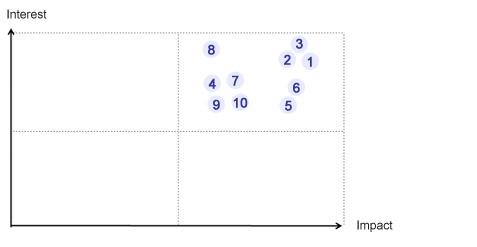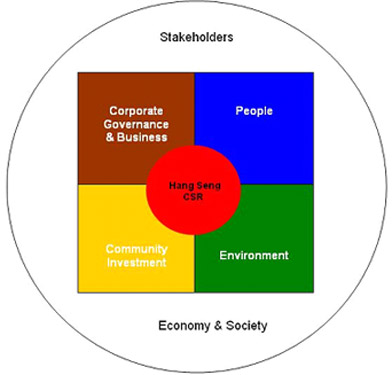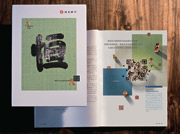
| Corporate Responsibility Report 2012 |
| Our Report | |
| Chief Executive's Message | |
| Our Values | |
| Our Business | |
| Our Commitment Performance |
|
| Our Commitment Corporate Governance |
|
| Our Commitment Customers |
|
| Our Commitment Suppliers |
|
| Our Commitment Staff |
|
| Our Commitment Environment |
|
| Our Commitment Community |
|
| Additional information | |
Upholding high standards of corporate responsibility is a vital part of our strategy for sustainable growth and has played a key role in our development to become the leading domestic bank in Hong Kong.
Managing sustainability issues requires balancing a diverse range of views and expectations but, simply stated, we strive for sustainable growth based on performing better every day for customers, colleagues and the community by emphasising service excellence in everything we do.
Materiality Diagram

Hang Seng is committed to leading by example in supporting sustainable development as we strive to achieve international standards in the things we do.
Our definition of success is to be a profitable, growing business by exceeding the expectations of our stakeholders through service excellence based on core values that include integrity, innovation and financial strength.
Such success is best achieved by maintaining a central emphasis on responsible corporate practices throughout our operations (see box: Hang Seng’s CR Matrix) and finding new and more effective ways to engage our customers, colleagues and local communities. How we do business is as important as what we do in continuing to refine our strategy for long-term growth.
This holistic approach supports good risk management, helps us pinpoint areas in which we can enhance efficiency and generates new business opportunities. It also offers us a competitive advantage as stakeholders increasingly focus on the social and environmental – as well as economic – performance of companies in the financial services industry.
Stakeholder Engagement
We use a variety of top-down and bottom-up approaches to openly, actively and effectively engage with our stakeholders, who include customers, staff, shareholders, suppliers and business partners, regulators and the broader community.
In striving for a participatory process we aim to better manage risk, maintain our market leadership through the early identification of and response to emerging trends, and strike a good balance in addressing a diverse range of expectations, views and objectives, with the overarching goal of optimising long-term outcomes for our business and our stakeholders.
| Key Stakeholders | Primary Methods of Engagement |
|---|---|
| 1. Customers |
|
| 2. Shareholders |
|
| 3. Employees |
|
| 4. Analysts |
|
| 5. Business partners |
|
| 6. Regulators |
|
| 7. Media |
|
| 8. NGOs |
|
| 9. Professional bodies |
|
| 10. Suppliers |
|
Continuous Improvement
Good corporate citizenship is not a static goal, but an ongoing process that requires monitoring, maintenance and a willingness to strive for continual improvement. We have worked hard to bring our sustainability reporting in line with the internationally recognised GRI guidelines – enabling us to evaluate our progress in a standardised manner and benchmark our performance against large listed corporations in Hong Kong and leading financial institutions around the world.
In addition to GRI requirements, the content and structure of our 2012 Report reflects a number of other factors, including:
- Issues identified through the CSR Sustainers workshop
- Issues arising from stakeholder engagement initiatives
- Issues commonly identified in the banking and finance industry, including benchmarking against other financial institutions
- Use of a materiality CR matrix
- Reference to ISO 14001
We continue to promote a business culture that encourages all our employees to play an active role in keeping corporate responsibility at the centre of our operations. Recent key initiatives in this regard including the appointment of our first ‘CSR Sustainers’ among senior members of staff throughout our organisation in 2011 and holding a CSR Sustainers workshop in 2012 to support efforts to further enhance our corporate responsibility performance (see box: CSR Best Practice: Building Responsibility From Within).
CSR Best Practice: Building Responsibility From Within
To further enhance employee support for our approach to corporate responsibility, in 2011 we appointed CSR Sustainers among senior members of staff throughout our organisation. Key responsibilities of these individuals include:
- Ensuring that our day-to-day business operates in line with our sustainability beliefs
- Collecting and recording data to facilitate corporate responsibility reporting
- Taking the lead in developing and promoting new sustainability initiatives
In 2012, we organised an inter-departmental CSR Sustainers workshop with the aim of helping to identify our material corporate responsibility issues and ways to further enhance engagement with internal and external stakeholders.
Other steps taken to strengthen internal buy-in include holding two CSR forums for staff, with invited guests sharing their thoughts and experience on giving back to society through active participation in community development and environmental developments of concern to Hong Kong.
Sustainable Business Success: Keystone Principle and Core Values
How we do business reflects our core values, which underlie our decision making, policies and actions. They also provide the foundation that supports our keystone principle – an unwavering commitment to service excellence.
Keystone Principle
Service Excellence: Achieving excellence in all our stakeholder relationships is the keystone of our strategy for long-term business success.
Core Values
Courageous Integrity: We act with courageous integrity in all we do, standing firm for what is right, regardless of any pressure to act differently. We make decisions without fear and without ever compromising the high ethical standards and integrity on which our business is built. Our people are dependable, open to different ideas and cultures, and connected to our customers, communities and each other. (Also see box: Dependable, Open, Connected in the ‘Our Commitment: Staff’ section of this Report.)
Financial Strength: Maintaining strong financial fundamentals gives us the ability to create long-term value for shareholders and make the best possible contribution to community betterment through economic growth and support of social and environmental development.
Leadership and Innovation: We are the leading domestic bank in Hong Kong, with a strong brand, extensive branch network and large base of customers. We work hard to maintain our reputation as a local pioneer in business best practice and as an innovator in product and service development. We lead by example in considering sustainability and corporate responsibility issues.
Transparency and Clear Communication: Our credibility is closely tied to quality of the information we provide to stakeholders. We continue to develop new and effective ways to engage stakeholders to better understand their priorities and concerns and to communicate clearly about all aspects of our business. We establish long-term partnerships with customers, business associates and community groups based on the loyalty and trust we build through championing open dialogue.
Hang Seng’s CR Matrix
| Corporate Governance & Business | People |
|---|---|
|
Direct
|
| Environment | Community Investment |
Direct
|
Direct
Indirect
|
Our CSR Model/Matrix

Top
| |
||


